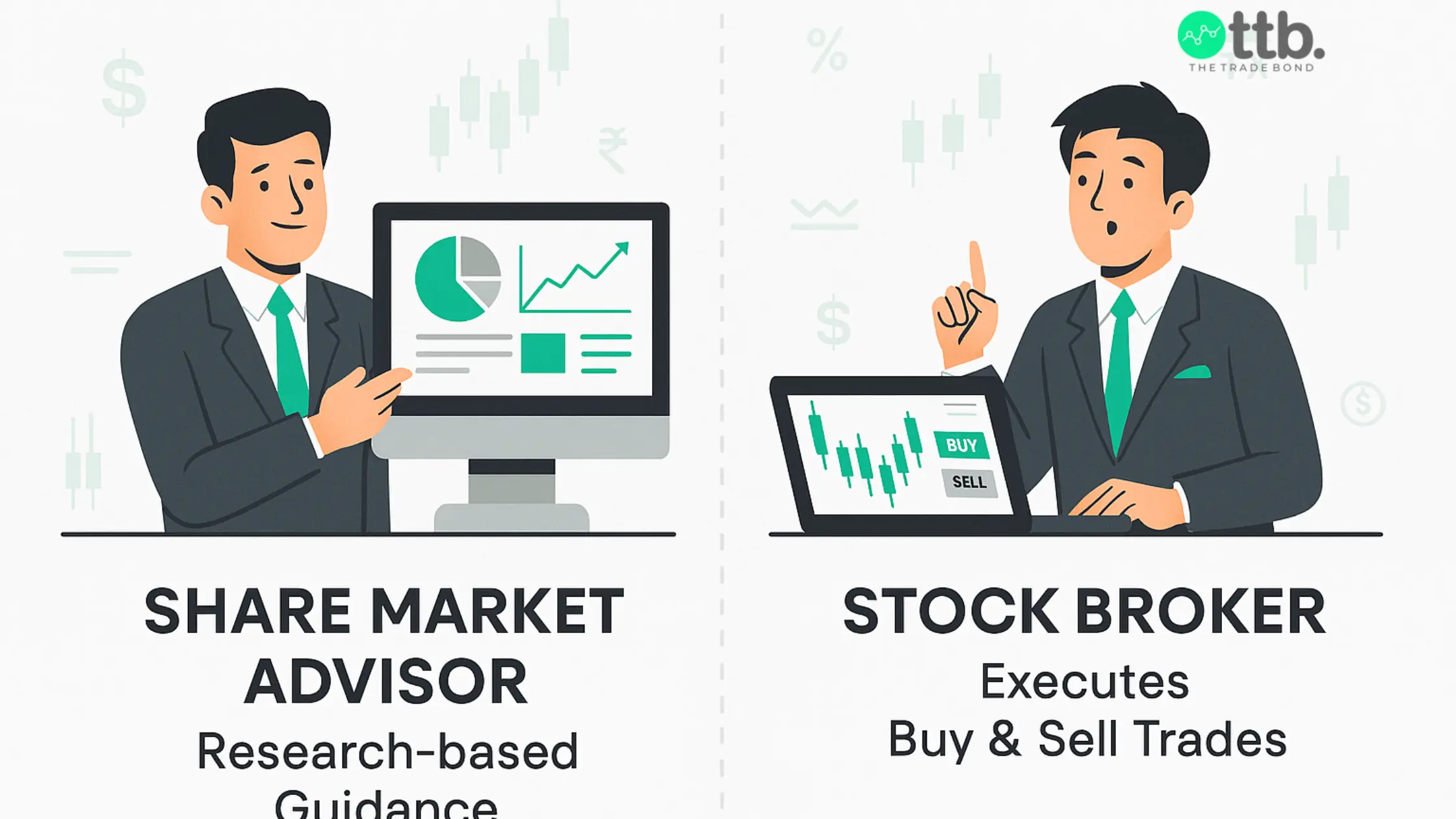Share Market Advisor vs Stock Broker: Key Differences Explained

The Difference between Share Market Advisor and Stock Broker
In the Indian financial market, both share market advisors and stock brokers play important roles. Trusted share market advisor focus on guiding investors with research-based recommendations. Coming to stock brokers they provide the platform to execute buy and sell trades. Here you will learn about a share market advisor vs stock broker key differences explained on this blog. Understanding this difference between share market advisor and stock broker helps investors to choose the right guidance for their trading and investment journey.
Knowing about Share Market Advisor and Stock Broker
Share Market Advisor:
A share market advisor gives you advice on what to buy, sell or hold. Mainly they provide research-based guidance, strategies, and insights for investors. They focus on helping clients understand opportunities and risks. Therefore they guide you to make better informed decisions.
Stock Broker:
On the other hand, a stock broker acts as an mediator between investors and the stock exchange. Stock brokers role is to help you buy and sell shares in securities as instructed by clients.
From The Trade Bond’s point of view, an advisor’s role is to guide investors towards trading and investing. Whereas brokers provide the platform to act on those decisions.
Major Differences between Share Market Advisor and Stock Broker
When we compare share market advisor and stock broker, the main differences is their role, responsibilities, and purpose.
Role: Share market advisor guide on what to buy or sell, while brokers don’t give any advices but they only execute trades.
Revenue Model: Advisors earn through advisory fees, while brokers make money from commissions or transaction charges.
Relationship with Investor: A stock market advisor build long-term relationships by offering insights, while brokers maintain transactional connections.
Scope: Advisors analyze fundamentals, trends, and strategies, whereas brokers help to quick execution on exchanges.
At The Trade Bond, we highlight this difference because many investors confuse service providers. Therefore, investors who only depend on execution may miss the benefits from stock market advisory services. But investors who follow tips without access to a broker can’t place trades effectively. Therefore, by understanding a share market advisor vs stock broker key differences explained on this blog can give you a clarity to whom to choose.
SEBI Guidelines for Share Market Advisors & Stock Broker
The Securities and Exchange Board of India regulates both advisors and brokers.
Share Market Advisors:
Share market advisors must register with SEBI as investment advisors. They must follow compliance norms and disclose conflicts of interest. Also, they should maintain transparency in their services. You can read our blog on why SEBI registration is important for Share market advisors.
Stock Brokers:
Stock brokers must be registered trading members of stock exchanges. They must follow reporting and operational standards.
Therefore, this regulatory framework ensures investors are protected and services remain structured.
At The Trade Bond, as a SEBI-registered advisor we follow SEBI norms which allow us to focus on ethical advisory practices. This helps to support investors in both learning and decision-making.
Long-term & Short-term Needs: Advisor vs Broker Perspective
For long-term investors, a professional share market advisor plays a major role. They offer strategies for portfolio building, diversification, and wealth creation. But a broker is still necessary to execute long-term trades.
For short-term traders, a share market advisor and stock broker are both important. A broker offers a quick execution platform, while an advisor provides trading strategies and insights that guide intraday or swing decisions.
At The Trade Bond, we view both roles as important. Therefore, without advisory, execution may lack direction, and without a broker, advisory insights can’t be acted upon.
Share Market Advisor or Stock Broker: Choose the Right One
Choosing between a share market advisor and stock broker depends on investor goals. So, if your requirement is just to place trades, a broker is sufficient. But if you need research and disciplined strategies, a share market advisor is essential. Many of the traders look for a combination of both. Also, understand how expert stock market advisors build trading discipline before choosing an advisor.
From The Trade Bond’s point of view, we believe investors shouldn’t treat advisors and brokers as substitutes. Instead, they should see them as partners serving different functions in the financial ecosystem. As a registered stock market advisor, we help investors to make informed decisions. To get investment tips from us, visit our share market investment tips for better results.
Conclusion
The difference between share market advisor and stock broker is one who guides and other executes. While SEBI guidelines clearly separates their functions. Therefore, investors often need both for effective participation in the markets. At The Trade Bond, as a share market advisor who adds value through research, discipline, and insights. By ensuring investors can work with their brokers more confidently.
FAQ's
How do stockbrokers earn money?
These stockbrokers earn through brokerage fees, commissions, or in the form of transaction charges.
Can a stockbroker also act as a share market advisor?
Stockbrokers’ primary role is execution, and they also provide research reports.
Which is better for long-term investors: a share market advisor or a stockbroker?
For long-term investors, a share market advisor is bigger when compared to stockbrokers. Because they build portfolios and strategies.
